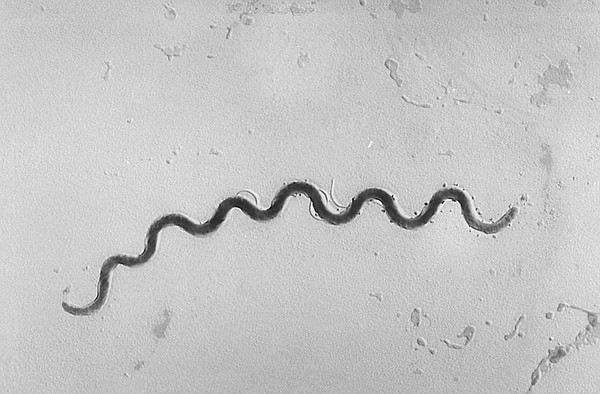Infection
Syphilis infections passed from mothers to babies on rise in Arkansas, nationally, health agencies warn
Cases of congenital syphilis, an infection passed from mother to newborn, have increased more than tenfold across the nation over the past decade, with more than 3,700 cases reported in 2022, according to a report by the U.S. Centers for Disease Control and Prevention.
According to the state Department of Health, Arkansas had 70 cases of congenital syphilis in newborns last year, up from 50 in 2021 and just 13 in 2017.
Eight of the infections in Arkansas last year were fatal, said Dr. Naveen Patil, the Health Department’s deputy state health officer and medical director of infectious diseases.
In a news release accompanying the CDC report last week, the federal health agency attributed the nationwide increase to “a rapidly accelerating epidemic of sexually transmitted infections.”
It said such infections occur “when mothers do not receive timely testing and treatment during pregnancy.”
In a March 2022 news release, the state Health Department warned of an increase in syphilis cases in Arkansas, saying “early” cases among women ages 15 to 44 had increased by 285%, from 155 to 597, from 2017 to 2021.
Despite the continuing increase in cases among newborns, however, data on the Health Department’s website indicates that the total number of syphilis cases among men and women of all ages declined slightly last year, falling to 1,457 after increasing from 562 to 1,516 from 2017 to 2021.
Babies born with congenital syphilis can be treated after birth, but the infection can leave long-term effects as they develop, including deformed bones, severe anemia, enlarged liver, brain and nerve problems and meningitis, according to the CDC.
“The baby will have to be admitted to the hospital for 10 or 14 days to be treated, but we don’t want to wait until they are born because the baby can have serious damage,” Patil said.
In 2021, Arkansas had the eighth-highest rate of congenital syphilis nationally, 139 cases for every 100,000 births, according to the CDC. Arizona had the highest rate, 181 cases per 100,000 births.
“Unfortunately, the Southern states always have a higher incidence of sexually transmitted infections, HIV or syphilis, chlamydia or gonorrhea, and we are no different. It’s been rough on us, especially in the last two, three years,” he said.
Patil said the pandemic and the shortages that came with it worsened the problem.
“So, first of all, during covid, many people engaged in high-risk behavior. Not many clinics were open for testing. People were hesitant to go to the clinic to get tested or treated and there were shortages of testing supplies, and it’s been on-and-off for testing supplies,” he said.
Nine out of 10 cases of congenital syphilis might have been prevented with timely testing and treatment during pregnancy, according to the release from the CDC.
“The problem there lies in that, because many of them seek care only at the time of delivery,” Patil said.
“So they just come during delivery. By that time it’s too late, and the kids are born. A third of our patients have no prenatal care at all.”
Arkansas physicians are mandated to test pregnant women at the beginning and third trimester of their pregnancy, Patil said, but a lack of transportation in rural communities is among the barriers that keep mothers from getting care.
“Access to care, you know, in large rural states, and the transportation barriers, these things don’t help with the rising cases,” Patil said.
Stigma and education also play a role in the lack of testing of pregnant women and the population in the state as a whole, he said.
“We need to educate providers to make sure that all their patients are screened for sexually transmitted diseases based on their sexual activities or sexual risk factors,” Patil said.
“There has to be a collaborative kind of approach between patients and providers and also between public health and providers and patients.”
In the news release, the CDC said that while newborn syphilis cases are increasing overall, babies born to Black, Hispanic or American Indian/Alaska native mothers were eight times more likely to be infected in 2021 than those born to white mothers.
“Such disparities stem from decades of deeply entrenched social determinants of health that create greater obstacles to quality health care services and result in health inequities such as higher rates of syphilis in some communities,” the CDC release said.
Symptoms of syphilis can include sores, rashes and flu-like symptoms. According to the state Health Department, most people with syphilis do not notice the symptoms at first.
“Symptoms eventually disappear, even without treatment. But syphilis must be treated or it will stay in the body and do further damage,” the department’s website says.
In April, the U.S. Food and Drug Administration announced a nationwide shortage of penicillin G benzathine, the drug used to treat syphilis in pregnant women, and Patil said it is expected to last for at least another six months.
Patil said Arkansas is getting a small but steady supply of the drug and prioritizing pregnant women and their partners. So far, he said, the shortage hasn’t stopped patients from getting treatment.
“But we don’t know how the situation is going to evolve over six months, so we are in constant touch with clinics and hospitals,” he said.
Ly is a Report for America Corps member.

